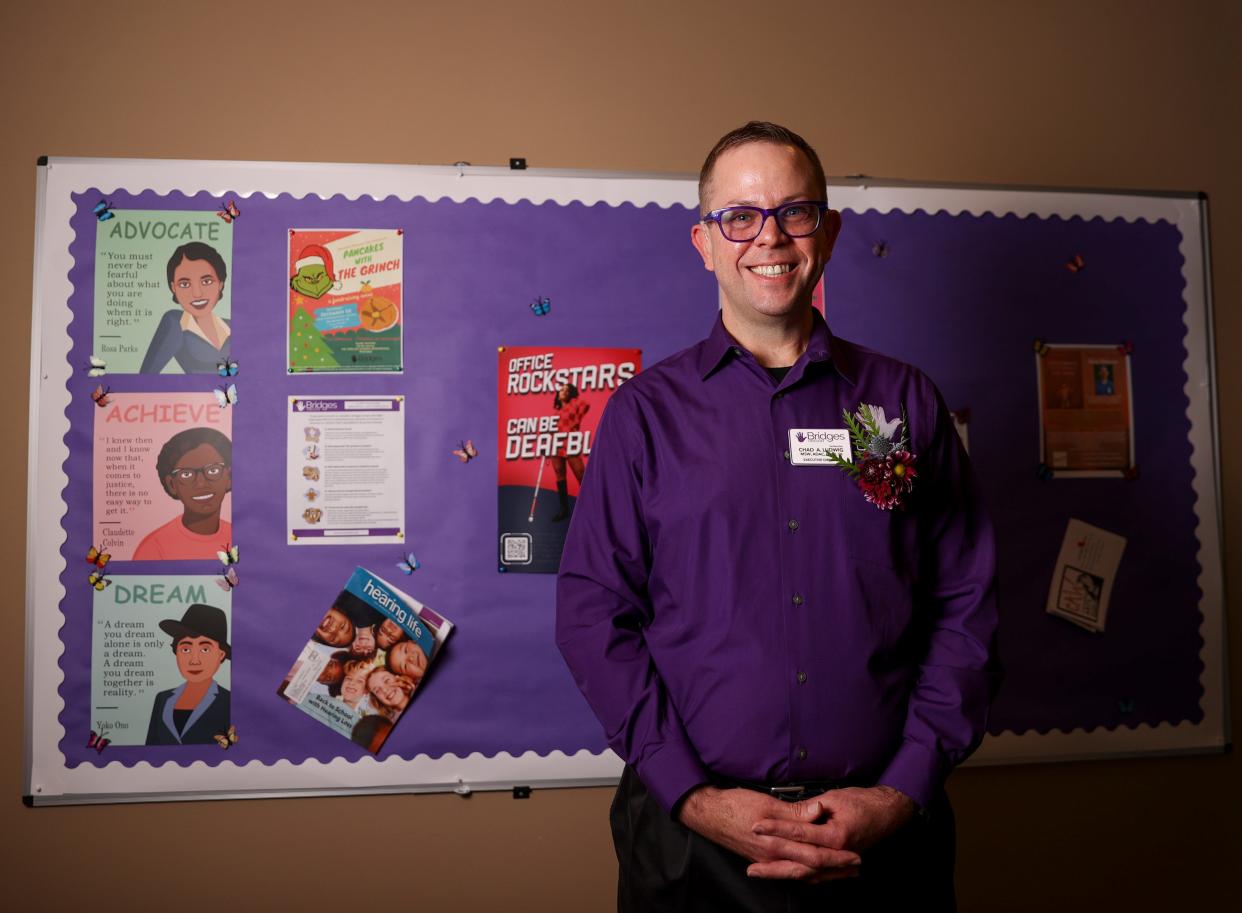Meet Our Mid-Valley: Chad Ludwig bridges service gaps for the Deaf community

This is part of a weekly series introducing readers to individuals who are passionate about our Mid-Valley community.
Chad A. Ludwig moved to Oregon from California more than a decade ago. The differences in services for residents who are deaf, deaf-blind or hard of hearing were shocking, he said.
"I saw what was here and it was nothing," Ludwig said.
For example, he said, in Washington, there are three Deaf organizations. In California, there are eight centers across the state. Oregon was one of the 12 western states that didn't have any services at the time, he said.
In 2017, Ludwig founded the nonprofit Bridges Oregon to bridge some of those service gaps and advocate to the state Legislature for more.
Ludwig, who is deaf, has a background in social work and nonprofit organization management.
He worked for several nonprofit organizations in Washington as an advocate and manager of advocacy services. He also worked in the telecommunications industry for 10 years, traveling to different states and trade shows before moving to Oregon about 12 years ago.
"Fed up" with telecommunications and new to the state, Ludwig worked with the Oregon Department of Human Services before Western Oregon University contacted him and offered him the role of director for the Research & Resource Center with Deaf communities.
It is a job he continues to hold full-time even as Bridges Oregon continues to grow in services and advocacy.
Addressing a lack of deaf services in Oregon
In 2015, the Oregon Legislature approved funding for a community-based needs assessment, which Western Oregon University conducted and published in 2016. Findings included conflicting policies and laws, inaccessible public services and various other barriers and needs for the Deaf community.
Researchers recommended the creation of a Commission for the Deaf, Hard of Hearing and Deaf-Blind.
Despite the findings, Ludwig said the Legislature failed to pass bills that would have met specific needs.
Frustrated, he decided to take on those needs himself.
The nonprofit hires and is led by other Deaf community members. They provide direct services to the Deaf community, including housing assistance, health care training and interpreters. In 2021, they began providing advocacy services for domestic violence survivors and crime victims.
While Bridges Oregon may not be the only organization providing assistance to victims of crimes, Ludiwg said it was the first and only "culturally specific and responsive" nonprofit in the state to provide those services solely to individuals who are deaf, deaf-blind and hard of hearing.
'An invisible disability community'
In September, the organization's four advocates were assisting 80 clients.
They work with survivors, assisting in police and lawyer interviews, helping them understand the legal process and their rights, and providing referrals to other programs for additional services.
"There's so many needs out there. We always hear that tagline, right? About not enough services to fill all the needs," Ludwig said. "For the Deaf community and the Deaf-blind and hard-of-hearing community, they're an invisible disability community and people don't actually stop and think about what their needs might be."
Last month, the organization hosted an open house to celebrate its first physical office location. More than 150 people joined them in the new Salem office space just a couple of blocks from the Oregon Capitol.
"One of the many reasons to have an office here close to the legislative building ... so that we can continue to do that important work of talking to the legislators and getting their attention," Ludwig said.
Rep. Tawna Sanchez, D-Portland, Rep. Tom Andersen, D-Salem, and Sen. Deb Patterson, D-Salem, were among those in attendance. Other organizations and agencies included the Oregon Health Authority, Oregon Department of Justice, the Center for Hope & Safety, the city of Salem and Western Oregon University.
Ludwig was encouraged by the passage of House Bill 2669 during the 2023 legislative session. The bill was referred to as the Deaf Children's Bill of Rights and officially declared that children who are deaf, hard of hearing or deaf-blind have the same rights as those who are not.
It also requires schools to provide specific services including appropriate screening and assessment of hearing and vision capabilities and inform parents or guardians about services and programs available.
HB 2696 also addressed sign language interpreter licensure, authorizing the Health Licensing Office to issue specified sign language interpreter licenses and establishing the State Board of Sign Language Interpreters.
'There's a lot more work'
Ludwig dreams of expanding services even further at Bridges Oregon, but capacity is limited.
"I want Bridges to be a bridge. I want it to be a place where we can strengthen accessibility, accessibility to information," Ludwig said. "So we are here as a new solution but we're not completely the solution. There's a lot more work that needs to be done."
If you have an idea for someone we should profile for this series, please email Statesman Journal executive editor Cherrill Crosby at ccrosby@statesmanjournal.com
Dianne Lugo covers the Oregon Legislature and equity issues. Reach her at dlugo@statesmanjournal.com or on Twitter @DianneLugo
This article originally appeared on Salem Statesman Journal: Bridges Oregon founder Chad Ludwig serves Deaf community

